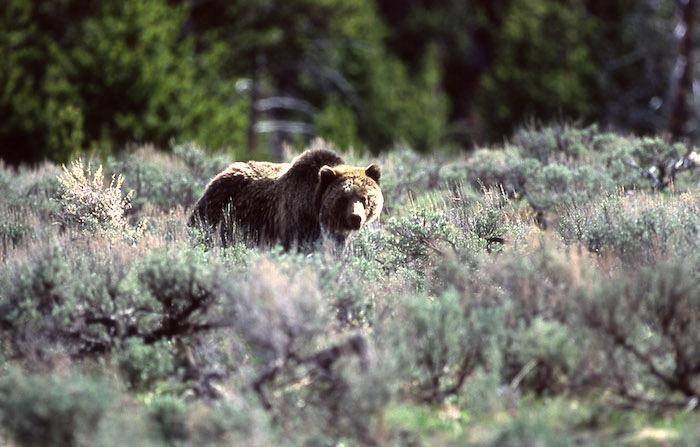
A lawsuit has been filed to block the delisting of grizzly bears in the greater Yellowstone ecosystem/NPS, Jim Peaco
Five months after they filed a lawsuit to block delisting of grizzly bears in the greater Yellowstone ecosystem, a coalition of tribal and conservation groups has filed another lawsuit to block the government's decision to remove Endangered Species Act protections from the bears.
The U.S. Fish and Wildlife Service decided last summer that grizzly bears in a 19,279-square-mile area around Yellowstone National Park should be managed by Wyoming, Idaho and Montana. But the Washington D.C. Court of Appeals threw a wrench in the federal government’s plans when it ruled in August on a related question regarding wolves in the Midwest. As a result, the agency announced the decision to solicit further comment on December 6.
At issue in the case is whether the agency can remove protections from a “distinct population segment” of a species and if so, how it must analyze the effect of that decision on other protected populations. The court’s ruling on wolves might affect the Fish and Wildlife Service grizzly bear delisting decision, the federal agency said, because, like Western Great Lakes wolves, Yellowstone grizzlies are considered a “distinct population segment.”
The extended comment period ended last Friday. On Monday, the coalition cited the recent reopening of public comment on the Yellowstone grizzly delisting rule as evidence the government did not complete its homework before removing important protections for this population of bears and opening the door to recreational trophy hunting of the iconic grizzly. In particular, the government failed to consider the impacts of its delisting decision on the opportunity for a broader recovery of grizzly bears in the lower 48 states, the groups maintain.
“The time for taking public comment and considering all issues surrounding the removal of federal protections for Yellowstone grizzlies was before those protections were removed – not after the decision was finalized,” said Earthjustice attorney Timothy Preso, who is representing the coalition. “The Yellowstone region’s grizzlies deserve better than to be subjected to trophy hunting based on a half-baked government decision.”
The lawsuit filed Monday seeks a summary judgment invalidating the Yellowstone grizzly delisting rule. It was filed by Earthjustice on behalf of the Northern Cheyenne Tribe, Sierra Club, Center for Biological Diversity, and National Parks Conservation Association.
Despite reopening the decision for comment, the Fish and Wildlife Service left the removal of Yellowstone grizzlies from the endangered species list in effect. That opens the door for Wyoming, Idaho, and Montana to plan for grizzly bear hunting seasons in the Yellowstone region, with Wyoming already taking steps toward developing a hunt that could begin later this year.
“This attempt by the Fish and Wildlife Service to reopen a public comment period and subsequently paper over its flawed delisting rule illustrates how politics has trumped science in regard to protecting Greater Yellowstone’s grizzly bears,” said Bonnie Rice, senior representative for Sierra Club’s Our Wild America campaign in the Greater Yellowstone region. “The Service’s decision to remove endangered species protections for Yellowstone grizzlies was clearly premature. The delisting rule should be withdrawn until the Service can get it right and make a determination that passes legal and scientific muster.”
“The Trump administration is trying to put a band-aid on a gaping hole in its decision to strip protections from Yellowstone’s precious bears,” said Noah Greenwald, endangered species director at the Center for Biological Diversity. “Grizzly bears occupy less than 5 percent of their former range in the lower 48 states, so they’re obviously nowhere near recovered. Attempting to delist the Yellowstone bears and expose them to trophy hunting without considering grizzlies’ poor status overall is simply ludicrous.”
“The Fish and Wildlife Service’s refusal to withdraw the delisting while publicly questioning the validity of their own decision is a disservice to the American people. Ignoring important legal and scientific concerns underscores the Department of Interior’s willingness to jeopardize the long-term health of Yellowstone and Grand Teton national park grizzlies” added Stephanie Adams, NPCA's Yellowstone program manager.
The coalition filed a lawsuit to challenge the Yellowstone grizzly delisting in August 2017 on the basis that the decision violates the Endangered Species Act. The coalition’s legal challenge takes issue with the Fish and Wildlife Service’s evaluation of the mortality consequences of the bears’ recent shift to a more heavily meat-based diet following the loss of other foods. It also faults the agency for "surgically delisting" the isolated Yellowstone grizzly population instead of focusing on a broader, more durable grizzly recovery in the West.
Since 1975, Yellowstone-area grizzly bears have been listed as threatened under the Endangered Species Act. Federal biologists acknowledge that population growth of the Yellowstone grizzly bear has flattened over the past decade and their own data indicates a decline from 2014 to 2016, the groups said last summer. Prior to and during that same period, the grizzly population has faced the loss of two of its most important food sources in the Yellowstone region—whitebark pine seeds and cutthroat trout—due to changing environmental conditions driven in part by a warming climate.
The Fish and Wildlife Service previously attempted to delist the Yellowstone grizzly population in 2007, but that decision was overturned by a federal district court in Montana along with the 9th Circuit Court of Appeals on the basis that the Service ignored the impacts of the whitebark pine loss on the grizzly population. In rejecting the Service’s 2007 grizzly delisting decision, the 9th Circuit admonished the agency that “the Service cannot take a full-speed ahead, damn-the-torpedoes approach to delisting—especially given the ESA’s ‘policy of institutionalized caution.’”





